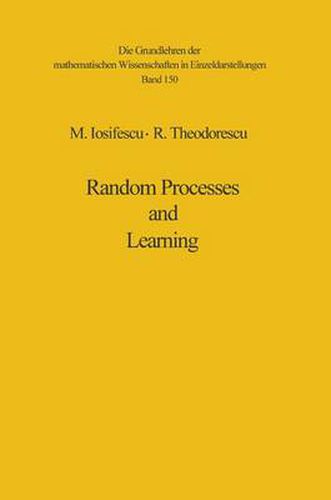Readings Newsletter
Become a Readings Member to make your shopping experience even easier.
Sign in or sign up for free!
You’re not far away from qualifying for FREE standard shipping within Australia
You’ve qualified for FREE standard shipping within Australia
The cart is loading…






This title is printed to order. This book may have been self-published. If so, we cannot guarantee the quality of the content. In the main most books will have gone through the editing process however some may not. We therefore suggest that you be aware of this before ordering this book. If in doubt check either the author or publisher’s details as we are unable to accept any returns unless they are faulty. Please contact us if you have any questions.
The aim of the present monograph is two-fold: (a) to give a short account of the main results concerning the theory of random systems with complete connections, and (b) to describe the general learning model by means of random systems with complete connections. The notion of chain with complete connections has been introduced in probability theory by ONICESCU and MIHOC (1935a). These authors have set themselves the aim to define a very broad type of dependence which takes into account the whole history of the evolution and thus includes as a special case the Markovian one. In a sequel of papers of the period 1935-1937, ONICESCU and MIHOC developed the theory of these chains for the homogeneous case with a finite set of states from differ ent points of view: ergodic behaviour, associated chain, limit laws. These results led to a chapter devoted to these chains, inserted by ONI CESCU and MIHOC in their monograph published in 1937. Important contributions to the theory of chains with complete connections are due to DOEBLIN and FORTET and refer to the period 1937-1940. They consist in the approach of chains with an infinite history (the so-called chains of infinite order) and in the use of methods from functional analysis.
$9.00 standard shipping within Australia
FREE standard shipping within Australia for orders over $100.00
Express & International shipping calculated at checkout
This title is printed to order. This book may have been self-published. If so, we cannot guarantee the quality of the content. In the main most books will have gone through the editing process however some may not. We therefore suggest that you be aware of this before ordering this book. If in doubt check either the author or publisher’s details as we are unable to accept any returns unless they are faulty. Please contact us if you have any questions.
The aim of the present monograph is two-fold: (a) to give a short account of the main results concerning the theory of random systems with complete connections, and (b) to describe the general learning model by means of random systems with complete connections. The notion of chain with complete connections has been introduced in probability theory by ONICESCU and MIHOC (1935a). These authors have set themselves the aim to define a very broad type of dependence which takes into account the whole history of the evolution and thus includes as a special case the Markovian one. In a sequel of papers of the period 1935-1937, ONICESCU and MIHOC developed the theory of these chains for the homogeneous case with a finite set of states from differ ent points of view: ergodic behaviour, associated chain, limit laws. These results led to a chapter devoted to these chains, inserted by ONI CESCU and MIHOC in their monograph published in 1937. Important contributions to the theory of chains with complete connections are due to DOEBLIN and FORTET and refer to the period 1937-1940. They consist in the approach of chains with an infinite history (the so-called chains of infinite order) and in the use of methods from functional analysis.